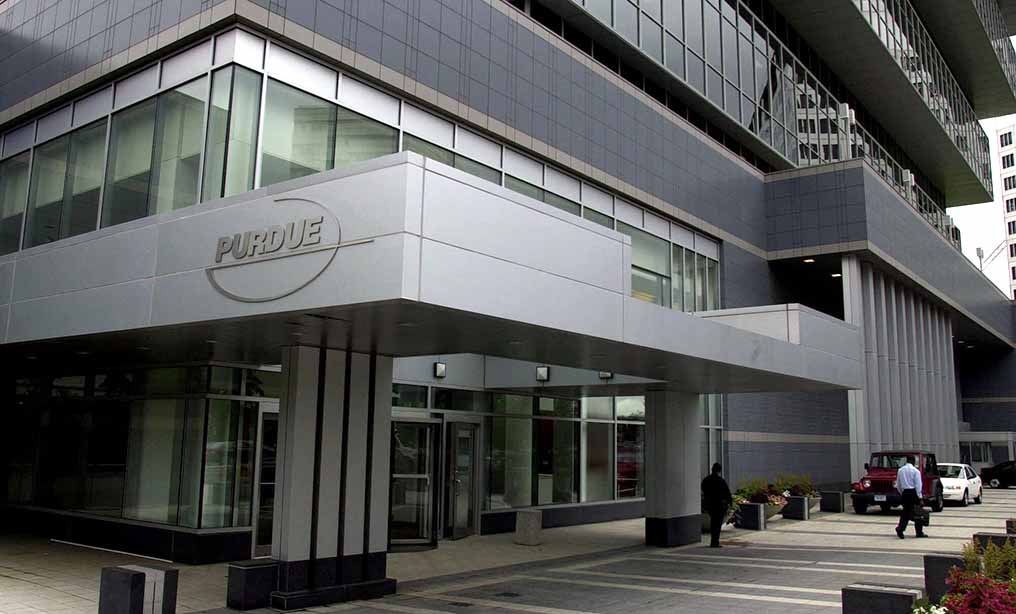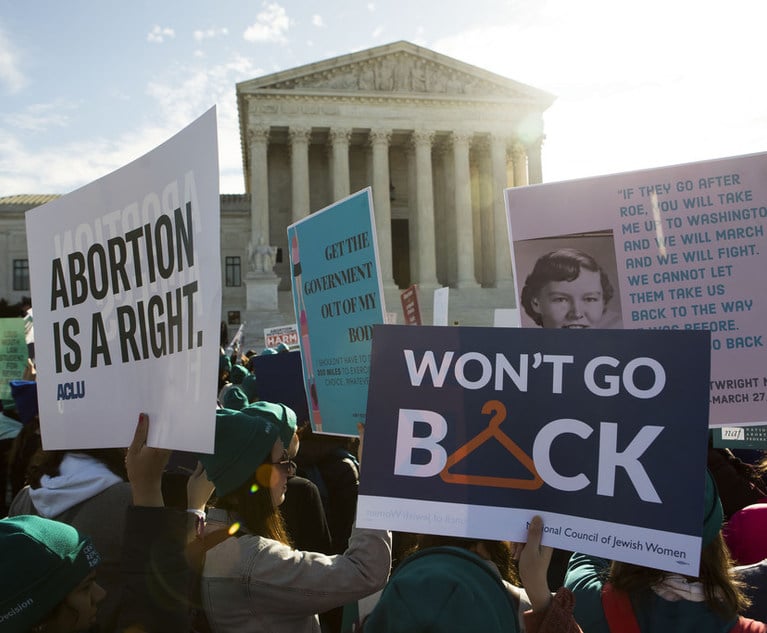NY State Officials Urge Bankruptcy Judge to Reject Purdue Pharma Request to Pay Out Bonuses
The letter was in response to a filing last week from attorneys for Purdue Pharma, which is seeking to pay out $34 million in bonuses for employees who had exceeded their target performance goals.
September 23, 2019 at 05:28 PM
5 minute read
The original version of this story was published on New York Law Journal
 Corporate headquarters of Purdue Pharma in Stamford, Conn. Photo: Douglas Healey/AP
Corporate headquarters of Purdue Pharma in Stamford, Conn. Photo: Douglas Healey/AP
The leader of New York state's top financial regulatory agency blasted efforts by Purdue Pharma on Monday to pay out $34 million in bonuses to its employees as part of the company's bankruptcy proceedings, citing the state's ongoing investigation into the opioid industry.
New York Department of Financial Services Superintendent Linda Lacewell urged a federal bankruptcy judge in a letter to reject the company's request, citing the damage done through the country's opioid crisis.
"Every dollar available should be used to recompense victims, and it would be inequitable, to say the very least, if the amount of the estate left to redress the tremendous harm suffered by those victims was diminished because employees were paid large sums upon exceeding expectations in causing that very harm," Lacewell wrote.
The letter was in response to a filing last week from attorneys for Purdue Pharma, which is seeking to pay out $34 million in bonuses for employees who had exceeded their target performance goals.
U.S. bankruptcy Judge Robert Drain of the Southern District of New York is expected to consider the request in October.
Purdue is represented in the bankruptcy proceeding by Eli Vonnegut and Marshall Scott Huebner of Davis Polk & Wardwell. Neither immediately returned a request for comment on Lacewell's letter.
She wrote in the letter to Drain that Purdue should be blocked from awarding any bonuses as part of the bankruptcy proceeding because her agency had recently concluded that the company's actions drove up health insurance costs for consumers in New York to the tune of $2 billion over the past decade.
DFS has since issued subpoenas and other document requests to more than 50 opioid companies, insurers and pharmacy benefit managers in an effort to seek restitution from the industry. Requests have also been made to individual members of the Sackler family, who own Purdue Pharma. The probe is ongoing, Lacewell said.
"Though our inquiry is not yet complete, it appears that various entities made intentional misrepresentations about the safety of opioids, over many years, and that those misrepresentations have helped cause the terrible opioid crisis we are facing as a nation," Lacewell said.
Those misrepresentations, she wrote, appear to have caused a wave of unnecessary opioid prescriptions, fraudulent prescription claims, and treatment for addiction to those drugs. That cost was born by insurance companies, but ultimately trickled down to consumers, according to DFS.
"The cost of that coverage has dramatically risen, in part as the direct result of increasing opioid-related claims," Lacewell wrote.
She labeled the overall amount of $34 million as "excessive" in the letter to Drain, but also said the bonuses shouldn't be allowed because of how they were earned. It could be argued that the performance targets cited by Purdue directly contributed to the opioid crisis, Lacewell wrote.
"The incentive programs under which these bonuses are to be paid might themselves have contributed to the harm suffered by people all over the country, including to the consumers I am duty bound to protect," she wrote.
The letter builds on public statements, and court filings, from other state officials in New York, which is one of many entities suing Purdue Pharma over its alleged involvement in causing, and feeding, the country's opioid crisis.
Gov. Andrew Cuomo criticized Purdue's efforts to award the bonuses in a statement Monday.
"Every penny of this $34 million should go directly to those victimized by this opioid scheme, as well as the taxpayers who have seen their health insurance costs go up to help cover the costs of addiction treatment," Cuomo said.
After Purdue had appeared to grow closer to a global settlement in the range of $10 to $12 billion in the litigation against it from thousands of entities and individuals in recent weeks, New York Attorney General Letitia James appeared, at the time, to throw cold water on the idea.
"A deal that doesn't account for the depth of pain and destruction caused by Purdue and the Sacklers is an insult, plain and simple," James said.
The state's lawsuit against Purdue is ongoing in Suffolk County Supreme Court.
READ MORE:
Consumers in NY Overpaid $2B in Insurance Premiums Because of Opioid Crisis, State Says
AG James Joins Call to Remove Barriers to Treatment for Opioid Use Disorder
NY Judge Allows Opioid Claims to Go Forward Against Sacklers
This content has been archived. It is available through our partners, LexisNexis® and Bloomberg Law.
To view this content, please continue to their sites.
Not a Lexis Subscriber?
Subscribe Now
Not a Bloomberg Law Subscriber?
Subscribe Now
NOT FOR REPRINT
© 2025 ALM Global, LLC, All Rights Reserved. Request academic re-use from www.copyright.com. All other uses, submit a request to [email protected]. For more information visit Asset & Logo Licensing.
You Might Like
View All
South Carolina Physicians Challenge Abortion Ban Under Religious Freedom Claims

7th Circ. Revives Transactional Dispute Against Military Retailer, Sends to State Court
4 minute read

DOJ, 10 State AGs File Amended Antitrust Complaint Against RealPage and Big Landlords
4 minute readTrending Stories
Who Got The Work
J. Brugh Lower of Gibbons has entered an appearance for industrial equipment supplier Devco Corporation in a pending trademark infringement lawsuit. The suit, accusing the defendant of selling knock-off Graco products, was filed Dec. 18 in New Jersey District Court by Rivkin Radler on behalf of Graco Inc. and Graco Minnesota. The case, assigned to U.S. District Judge Zahid N. Quraishi, is 3:24-cv-11294, Graco Inc. et al v. Devco Corporation.
Who Got The Work
Rebecca Maller-Stein and Kent A. Yalowitz of Arnold & Porter Kaye Scholer have entered their appearances for Hanaco Venture Capital and its executives, Lior Prosor and David Frankel, in a pending securities lawsuit. The action, filed on Dec. 24 in New York Southern District Court by Zell, Aron & Co. on behalf of Goldeneye Advisors, accuses the defendants of negligently and fraudulently managing the plaintiff's $1 million investment. The case, assigned to U.S. District Judge Vernon S. Broderick, is 1:24-cv-09918, Goldeneye Advisors, LLC v. Hanaco Venture Capital, Ltd. et al.
Who Got The Work
Attorneys from A&O Shearman has stepped in as defense counsel for Toronto-Dominion Bank and other defendants in a pending securities class action. The suit, filed Dec. 11 in New York Southern District Court by Bleichmar Fonti & Auld, accuses the defendants of concealing the bank's 'pervasive' deficiencies in regards to its compliance with the Bank Secrecy Act and the quality of its anti-money laundering controls. The case, assigned to U.S. District Judge Arun Subramanian, is 1:24-cv-09445, Gonzalez v. The Toronto-Dominion Bank et al.
Who Got The Work
Crown Castle International, a Pennsylvania company providing shared communications infrastructure, has turned to Luke D. Wolf of Gordon Rees Scully Mansukhani to fend off a pending breach-of-contract lawsuit. The court action, filed Nov. 25 in Michigan Eastern District Court by Hooper Hathaway PC on behalf of The Town Residences LLC, accuses Crown Castle of failing to transfer approximately $30,000 in utility payments from T-Mobile in breach of a roof-top lease and assignment agreement. The case, assigned to U.S. District Judge Susan K. Declercq, is 2:24-cv-13131, The Town Residences LLC v. T-Mobile US, Inc. et al.
Who Got The Work
Wilfred P. Coronato and Daniel M. Schwartz of McCarter & English have stepped in as defense counsel to Electrolux Home Products Inc. in a pending product liability lawsuit. The court action, filed Nov. 26 in New York Eastern District Court by Poulos Lopiccolo PC and Nagel Rice LLP on behalf of David Stern, alleges that the defendant's refrigerators’ drawers and shelving repeatedly break and fall apart within months after purchase. The case, assigned to U.S. District Judge Joan M. Azrack, is 2:24-cv-08204, Stern v. Electrolux Home Products, Inc.
Featured Firms
Law Offices of Gary Martin Hays & Associates, P.C.
(470) 294-1674
Law Offices of Mark E. Salomone
(857) 444-6468
Smith & Hassler
(713) 739-1250








